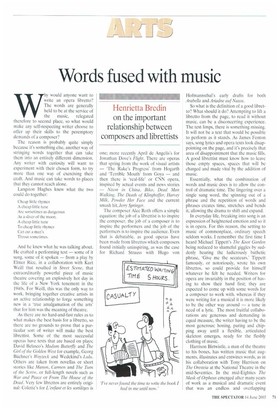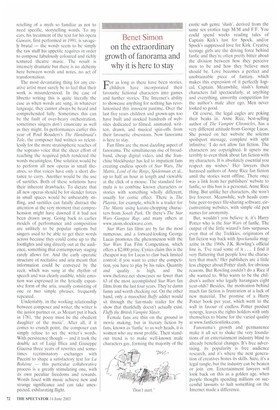Words fused with music
Henrietta Bredin on the important relationship between composers and librettists
Why would anyone want to write an opera libretto? The words are generally held to be at the service of the music, relegated therefore to second place, so what would make any self-respecting writer choose to offer up their skills to the peremptory demands of a composer?
The reason is probably quite simply because it's something else, another way of stringing words together that can take them into an entirely different dimension. Any writer with curiosity will want to experiment with their chosen form, to try more than one way of exercising their craft. And music can take words to places that they cannot reach alone.
Langston Hughes knew what the two could do together: Cheap little rhymes A cheap little tune Are sometimes as dangerous As a sliver of the moon.
A cheap little tune To cheap little rhymes Can cut a man's Throat sometimes.
And he knew what he was talking about. He crafted a performing text — some of it sung, some of it spoken — from a play by Elmer Rice, in a collaboration with Kurt Weill that resulted in Street Scene, that extraordinarily powerful piece of music theatre covering an explosively hot day in the life of a New York tenement in the 1940s. For Weill, this was the only way to work, bringing together creative artists in an active relationship to forge something new in a 'true amalgamation of the arts' that for him was the meaning of theatre, As there are no hard-and-fast rules as to what makes the best basis for a libretto, so there are no grounds to prove that a particular sort of writer will make the best librettist. Some of the most successful operas have texts that are based on plays; David Belasco's Madam Butterfly and The Girl of the Golden West for example, Georg Btichner's Woyzeck and Wedekind's Lulu, Others are taken from novellas or short stories like Manon, Carmen and The Turn of the Screw, or full-length novels such as War and Peace or From The House of the Dead. Very few librettos are entirely original: Colette's for L'enfant et les sortileges is one; more recently April de Angelis's for Jonathan Dove's Flight. There are operas that spring from the work of visual artists — 'The Rake's Progress' from Hogarth and 'Terrible Mouth' from Goya — and then there is 'real-life' or CNN opera, inspired by actual events and news stories — Nixon in China, Biko. Dead Man Walking, The Death of Klinghoffer, Harvey Milk, Powder Her Face and the current smash hit, Jerry Springer.
The composer Alec Roth offers a simple equation: the job of a librettist is to inspire the composer, the job of a composer is to inspire the performers and the job of the performers is to inspire the audience. Even that is debatable, as good operas have been made from librettos which composers found initially uninspiring, as was the case for Richard Strauss with Hugo von Hofmannsthal's early drafts for both Arabella and Ariadne auf Naxos.
So what is the definition of a good libretto? What should it do? Attempting to lift a libretto from the page, to read it without music, can be a disconcerting experience. The text limps, there is something missing. It will not be a text that would be possible to perform as it stands. As James Fenton says, song lyrics and opera texts look disappointing on the page, and it's precisely that area of disappointment that the music fills. A good librettist must know how to leave those empty spaces, spaces that will be charged and made vital by the addition of music.
Essentially, what the combination of words and music does is to allow the control of dramatic time. The lingering over a single sung word, the spinning out of a phrase and the repetition of words and phrases creates time, stretches and bends it, allowing the drama to shift and expand.
In everyday life, breaking into song is an expression of heightened emotion and so it is in opera. For this reason, the setting to music of commonplace, ordinary speech seldom works. I remember the first time I heard Michael Tippett's The Knot Garden being reduced to shameful giggles by suddenly hearing the ludicrously bathetic phrase, 'Give me the secateurs.' Tippett famously, or notoriously, wrote his own librettos, so could provide for himself whatever he felt he needed. Writers for opera are invariably in the position of having to show their hand first; they are expected to come up with some words for a composer to work with, whereas if they were writing for a musical it is more likely to be the other way around — a tune in need of a lyric. The most fruitful collaborations are generous and demanding in equal measure, the writer having to be the most generous; honing, paring and chipping away until a flexible, articulated skeleton emerges, ready for the fleshly clothing of music.
Harrison Birtwistle. a man of the theatre to his bones, has written music that augments, illustrates and entwines words, as in his collaboration with Tony Harrison on The Oresteia at the National Theatre in the mid-Seventies. In the mid-Eighties The Mask of Orpheus emerged after many years of work as a musical and dramatic event that was an endless and overlapping
retelling of a myth so familiar as not to need specific, storytelling words. To my ears, his treatment of the text for his opera Gawain, first performed in 1991, is savagely brutal — the words seem to be simply the raw stuff his appetite requires in order to compose fabulously coloured and richly textured theatre music. The result is intensely dramatic but there is no alchemy here between words and notes, no act of transformation.
The most devastating thing for any creative artist must surely be to feel that their work is misunderstood. In the case of libretto writing this is quite literally the case as when words are sung, in whatever language, they cannot always be heard and comprehended fully. Sometimes this can be the fault of over-heavy orchestration, sometimes singers don't enunciate as well as they might. In performances earlier this year of Foul Rouders's The Handmaid's Tale, the composer had written so relentlessly for the more stratospheric reaches of the soprano voice that the sheer effort of reaching the required pitch rendered the words meaningless. One solution would be to perform all new operas in small theatres, so that voices have only a short distance to carry. Another would be the use of surtitles. Both of these solutions have their inherent drawbacks. To dictate that all new operas should be for slender forces in small spaces would be unbearably stifling, and surtitles can fatally distract the attention at the very moment that comprehension might have dawned if it had not been drawn away. Going back to earlier models of performance and composition are unlikely to be popular options but singers used to be able to get their words across because they could come up to the footlights and sing directly out at the audience, something that contemporary staging rarely allows for. And the early operatic structure of recitative and aria meant that information could be conveyed by the recit, which was sung at the rhythm of speech and was clearly audible, while emotion was expressed in the lyrically expansive form of the aria, usually consisting of one or two simple phrases, frequently repeated.
Undeniably, in the working relationship between composer and writer, the writer is the junior partner or, as Mozart put it back in 1781, 'the poesy must be the obedient daughter of the music'. After all, if it comes to crunch point, the composer can simply refuse to set the writer's words. With persistence though — and it took the double act of Luigi Illica and Giuseppe Giacosa three years of rewrites and sometimes recriminatory exchanges with Puccini to shape a satisfactory text for La Boheme — this particular collaborative process is a greatly stimulating one, with its own peculiar freedoms and rewards. Words fused with music achieve new and strange significance and can take unexpected, exhilarating flight.



































































































 Previous page
Previous page